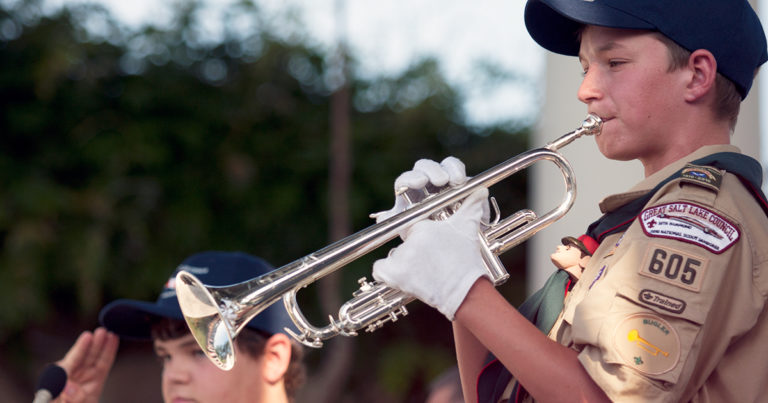Encourage your Scouts to answer the call to bugle

It’s a classic summer camp sound: the rousing wake-up call of “Reveille” played on a bugle.
It was once practically considered a standard piece of Scout equipment; the 1911 Handbook suggested every patrol have a bugle. They are perfect for communicating a message in a large area instead of straining your vocal cords by yelling.
Outside of camp though, you might rarely hear the instrument, especially if there isn’t a bugler in your unit. On our annual posts of the most popular merit badges, Bugling often ranks among one of the rarest earned.
While its prominence has seemed to wane over the decades, it’s important not to forget the powerful role bugles can play in Scouting — and not just at summer camp.
Listen up
A Scout can play more than “Reveille” in the morning and “Taps” when it’s time to go to bed on a campout. There are 15 bugle calls Scouts are required to know to earn the Bugling merit badge. They can be played at meetings and other outings. There are calls designed to get Scouts’ attention (“First Call”), let everyone know it’s time to eat (“Mess Call”), honor the country during a flag ceremony (“To the Colors”) and even signal when everyone can go for a dip in the pool (“Swimming”). Get the Music and Bugling merit badge pamphlet to read the notes for these calls.

These call notes can be peppy and quick or slow and somber. The 24 notes that comprise “Taps” can evoke a sense of relaxation and reflection when played at the end of the day, and they can swell one’s heart with patriotic pride during a school assembly, holiday ceremony or military funeral.
Knowing how to play a bugle allows Scouts to volunteer by playing a part in many community events, such as a Memorial Day or Veterans Day ceremony or at a funeral. If a unit is approached by a group or municipality to perform, a couple of items should be kept in mind.
“They are encouraged to assist in doing their Good Turn,” says Garfield Murden, Boy Scouting national director. “They should not be doing this for money, and they need to make sure they are following the Barriers of Abuse and Guide to Safe Scouting.”
Learning to play a bugle can also help in rank advancement.
Scouts can serve four months as the troop’s bugler en route to earning the Star rank and six months in that position for Life. The position does not, however, fulfill the “position of responsibility” requirement for the Eagle Scout Award.
Buglers help bring order and efficiency to unit activities by signaling what fellow Scouts should do at a certain time. Their work aids leaders in assembling Scouts and getting their attention.
Brass horn greenhorns
So, how can you revive this Scouting tradition in your unit?
First of all, you can encourage Scouts who are members of a band to use their talents within the troop or Sea Scout ship, too. They can play a bugle, trumpet or cornet. Show them how their talents can serve the troop and community.
Venturing crews can specialize in music, including bugle corps/drill teams. Some Cub Scout Adventure electives, like Webelos Maestro!, feature music, presenting opportunities to introduce Scouts to instruments.
While you certainly could spend a couple hundred dollars on a brand-new quality instrument for your unit, you can find cheaper used options at your local music shop, online or borrowed from a fellow Scouter’s attic.
For Scouts who aren’t musically inclined, trying the bugle can be intimidating. Many Scouts have cited Bugling as one of the more difficult badges to master. If they struggle, remind them to continue doing their best and not get discouraged.
